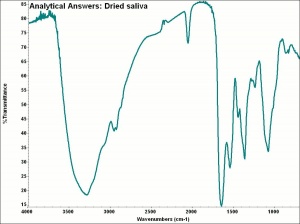Difference between revisions of "Saliva"
Jump to navigation
Jump to search
(username removed) |
m (Text replace - "== Authority ==" to "== Sources Checked for Data in Record ==") |
||
| Line 15: | Line 15: | ||
P.M.S.Romao, A.M.Alarao, C.A.N.Viana, "Human saliva as a cleaning agent for dirty surfaces" ''Studies in Conservation'' Vol 35 (3):153-155, 1990. | P.M.S.Romao, A.M.Alarao, C.A.N.Viana, "Human saliva as a cleaning agent for dirty surfaces" ''Studies in Conservation'' Vol 35 (3):153-155, 1990. | ||
| − | == | + | == Sources Checked for Data in Record == |
* ''The American Heritage Dictionary'' or ''Encarta'', via Microsoft Bookshelf 98, Microsoft Corp., 1998 | * ''The American Heritage Dictionary'' or ''Encarta'', via Microsoft Bookshelf 98, Microsoft Corp., 1998 | ||
Revision as of 17:10, 1 May 2016
Description
A watery mucus secreted into vertebrate mouths by small glands in the interior of the cheeks, tongue, and palate. Saliva contains water, mucins, proteins, enzymes (amylase, ptyalin), and salts. It serves to moisten the mouth, remove food debris, and breakdown carbohydrates. Saliva has been used as a readily available cleaning agent since ancient times.
Other Properties
Saliva is slightly alkaline.
Soluble in water and dilute alkaline solutions. Insoluble in acetic acid.
Additional Information
P.M.S.Romao, A.M.Alarao, C.A.N.Viana, "Human saliva as a cleaning agent for dirty surfaces" Studies in Conservation Vol 35 (3):153-155, 1990.
Sources Checked for Data in Record
- The American Heritage Dictionary or Encarta, via Microsoft Bookshelf 98, Microsoft Corp., 1998
- Encyclopedia Britannica, http://www.britannica.com Comment: "saliva" Encyclopædia Britannica online, [Accessed April 26, 2002]
- Random House, Webster's Encyclopedic Unabridged Dictionary of the English Language, Grammercy Book, New York, 1997
